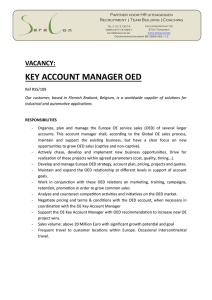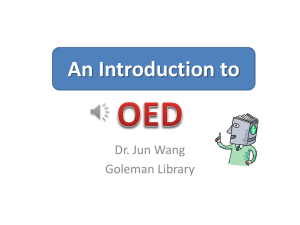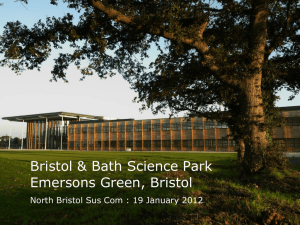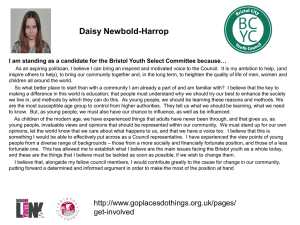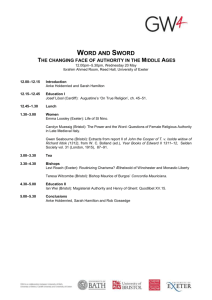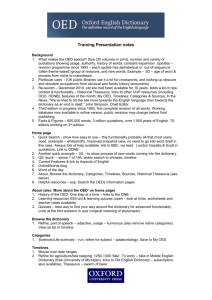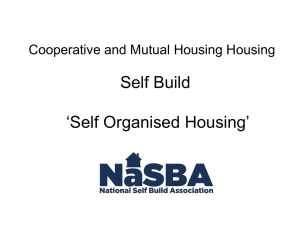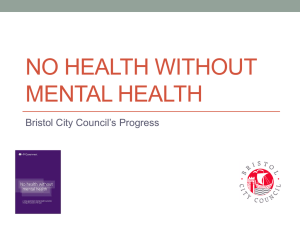Oberhofer, Katharina (2011) Bristol speech: linguistic and folk views
advertisement
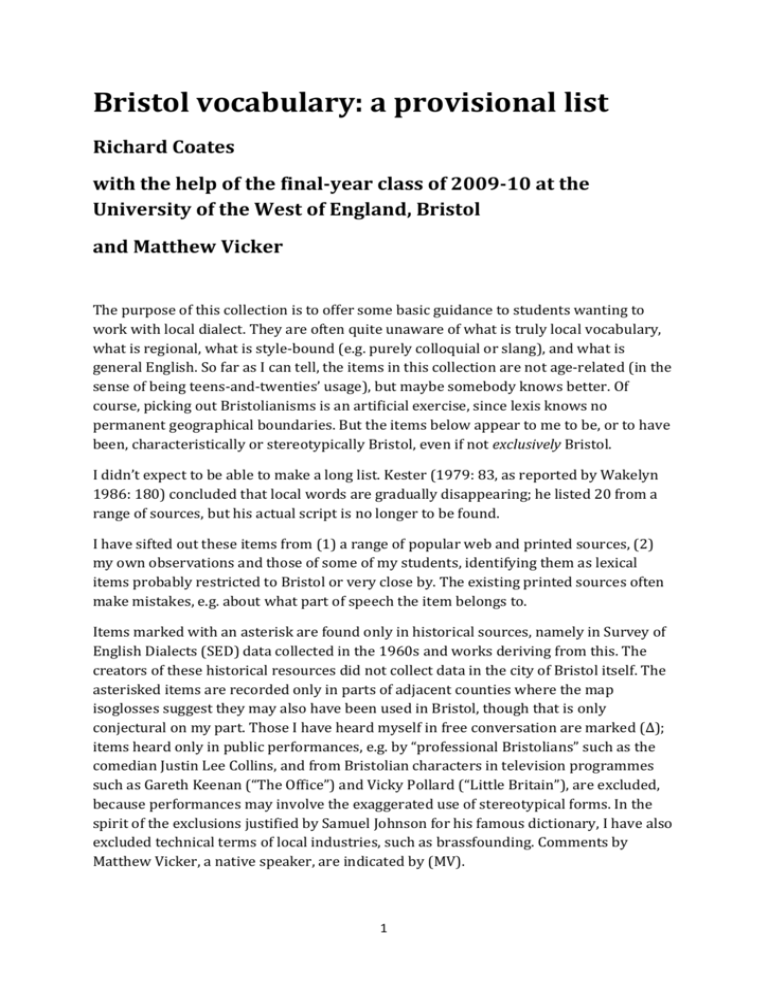
Bristol vocabulary: a provisional list Richard Coates with the help of the final-year class of 2009-10 at the University of the West of England, Bristol and Matthew Vicker The purpose of this collection is to offer some basic guidance to students wanting to work with local dialect. They are often quite unaware of what is truly local vocabulary, what is regional, what is style-bound (e.g. purely colloquial or slang), and what is general English. So far as I can tell, the items in this collection are not age-related (in the sense of being teens-and-twenties’ usage), but maybe somebody knows better. Of course, picking out Bristolianisms is an artificial exercise, since lexis knows no permanent geographical boundaries. But the items below appear to me to be, or to have been, characteristically or stereotypically Bristol, even if not exclusively Bristol. I didn’t expect to be able to make a long list. Kester (1979: 83, as reported by Wakelyn 1986: 180) concluded that local words are gradually disappearing; he listed 20 from a range of sources, but his actual script is no longer to be found. I have sifted out these items from (1) a range of popular web and printed sources, (2) my own observations and those of some of my students, identifying them as lexical items probably restricted to Bristol or very close by. The existing printed sources often make mistakes, e.g. about what part of speech the item belongs to. Items marked with an asterisk are found only in historical sources, namely in Survey of English Dialects (SED) data collected in the 1960s and works deriving from this. The creators of these historical resources did not collect data in the city of Bristol itself. The asterisked items are recorded only in parts of adjacent counties where the map isoglosses suggest they may also have been used in Bristol, though that is only conjectural on my part. Those I have heard myself in free conversation are marked (∆); items heard only in public performances, e.g. by “professional Bristolians” such as the comedian Justin Lee Collins, and from Bristolian characters in television programmes such as Gareth Keenan (“The Office”) and Vicky Pollard (“Little Britain”), are excluded, because performances may involve the exaggerated use of stereotypical forms. In the spirit of the exclusions justified by Samuel Johnson for his famous dictionary, I have also excluded technical terms of local industries, such as brassfounding. Comments by Matthew Vicker, a native speaker, are indicated by (MV). 1 I have excluded characteristic local grammatical items (e.g. forms of modals like casn’t ‘(you) can’t’ = ‘(thou) canst not’) and constructions (like where … to? Meaning simply ‘where?’), and local pronunciations of otherwise general words (e.g. forms with the famous so-called “Bristol L”). I have also excluded everything I wasn’t pretty convinced about. If you can add to the list or reject any of these, I would be pleased. Let me know at richard.coates@uwe.ac.uk. Most of the items may be well known to you already. ********************************************************************* *AFEARED ‘frightened’ [mainly Somerset, SED VIII.8.2, also wider West Country] BABBA, BABBER, BABS ‘baby’; ‘mate’ [cf. Welsh baban which has been claimed as the source of the English word baby (Breeze 1993)] BAITY ‘angry’ [seems to have been originally London school slang from the mid19th century (OED); cf. bate, bait ‘fit of temper’] (TO HAVE A) BENNY ‘fit of temper’ [said to be from the name of the character Benny Hawkins in the TV soap Crossroads (1964-86)] BLAD ‘idiot, loser’ BLIGE! exclamation of surprise, ‘blimey!’ [evidently from oblige, but I don’t know how or why, unless as a euphemism for blimey, which is already a bit euphemistic] (∆, informant BI) CACKS ‘pants’ [obscurely related to more widespread kecks (< kicks?) ‘trousers, pants’, attributed originally to Liverpool by Eric Partridge (OED); does it show pre-velar vowel lowering like that met in Sussex or west Somerset, or contamination by cack ‘shit’?] CHOB(B)ING ‘stealing apples from the orchard, scrumping’ [twice in A mouthful of memories, Avonmouth reminiscences] *CHOCK-TEETH ‘molars’ [also in nearby counties SED VI.5.7, but always close to Bristol; OED speculates that some early spellings may be mistaken for cheektooth, or be related to choke, but the dialect data shows that that is probably wrong and that the word is best seen as related to chock ‘lump, block’, from the shape of the relevant teeth. Chock is found as a surname in Westbury on Trym in the 17th century, and survives there in Chock Lane; relevance not clear, might be for chalk or the surname Chalk.] 2 (TO) CIDER [someone] UP ‘to line up a drink of cider [for someone]’ (TO) COME TIGHT ‘to hurt (intransitive)’ (TO) COOPIE/COUPIE DOWN ‘to crouch down’ [also north Somerset; seemingly from coupee, a particular dance-step, extended to mean a ‘sort of bow or salutation in dancing’ (OED)] (TO) DAP ‘to bounce’ (SED VIII.7.3); DAP ‘plimsoll’ [I suspect the latter derives from the former – the rubber soles of the shoes allow you to spring up and down easily − but there are other (folk-)etymologies on offer for the latter•, which is also found in adjacent counties and South Wales]; from the ‘bounce’ sense comes also DAPPER ‘child, toddler’ [cf. the widespread cliché a bouncing baby] • Dap cannot be an acronym of “Dunlop Athletic Plimsolls”, as sometimes claimed, because it appears in the Western Daily Press in March 1924 (OED) whilst the Dunlop Rubber Company did not take over the original maker till 1925 (Wikipedia, under “Plimsoll shoes”). Hence also DAP-BAG (informant MV). (TO) DOG UP ‘to eye [someone] up threateningly’ [metaphor based on aggressive dog behaviour] DRIVE ‘(bus-)driver’ [used as a term of address, stereotypically in “Cheers, drive”] (∆) (TO) FIRE UP ‘to beat up’ [is this right? or is it a misunderstanding of sense 5 of fire v.1 in OED, ‘to show sudden heat or anger’, or an extension of this sense from an emotion to its consequences?] *FLANNEL ‘vest’ [word said to be from Welsh gwlanen ‘flannel’ (or its softmutated form wlanen); the later meaning would be ingredient-meronymy (i.e. with a word for a material used to name the object which is made out of it, like a cane or an iron)] (MV sceptical of the word’s existence in Bristolian) FOWSTY ‘mouldy’ [probably variant of fusty, cf. and contrast the relation between dust(y) and the surname Dowst; sense extended from the smell to the cause of it] (MV: bruises/cuts can go fowsty too) GLENNER ≈ ‘loony’ [i.e. someone seen as suitable for homing in the former Glenside Mental Hospital, Stapleton] GLIDER ‘cider’ [from the rhyme? why? any other justification? – from the name of a particular home brew of 1987??? jingling term for a cider drinker?] Sometimes also appears as hang glider 3 GRAMPFER GREY ‘woodlouse’. Other local names are found in nearby counties; this one is not otherwise recorded. Cf. common dialect gran(d)fer ‘grandfather’. GRAMPS [pet-name for] ‘grandfather’ (MV; ∆) GRANNER ‘grandmother’ (TO) GUFF ‘to fart’. Seems not to be originally Bristolian; early mentions in the sense ‘puff, whiff’ appear to be Scots (OED). HEADFIT ‘fit of temper’ JAN ‘tramp’ [possible generic usage of the West Country form of John; cf. jack ‘fellow, etc.’, ‘representative common person’ (OED Jack n1, I.1.a and I.2.a), ‘every man jack’] KEENER ‘hard worker, geek’; generally adjective + (?) agentive -ER is possible, cf. e.g. MUNTER; it seems to be the construction type, as much as the individual words, which is Bristolian [cf. OED keener n.2 ‘[o]ne who drives a hard bargain; also, a person or thing in some way superior’; the Bristol term seems to be a reinvention of the form in a slightly different sense] LUSH, general adjective of approval, often intensified as GERT LUSH [probably originally abbreviated from luscious as a term of general (including sexual) approval, rather than as a bleaching of the adjective lush ‘luxuriant’; far from clear it was originally Bristolian, and the first recorded use in something close to the Bristolian sense is in Richmal Crompton’s novel The thorn-bush (1928) – see OED draft additions to lush adj1 (2007); (∆), also reported by informant PJC mainly about her dog] MACKY ‘very big’ [stereotypically applied to feet] MINT ‘great, fantastic’ (i.e. adj. of approval) [extension of word as used in in mint condition? possibly not so much regional as 1970s teenage slang. MV sceptical whether originally Bristolian. Cf. more widespread minted ‘well off’] MUCKER ‘mate’ (MV; ∆) MUNT ‘bad, off, not nice’ [for MUNTER, see KEENER] *PINE-END ‘gable-end’ [SED V.1.5; term known also from Wales, so probably originally from Welsh piniwn ‘gable’, see OED] (TO GO A) PISSER ‘(to have a) a bad fall’ [meaning restricted from something originally more general, ‘[a] dispiriting, frustrating, or annoying circumstance, turn of events, etc.’ (OED sense II.3.b)? structure and possible original meaning of noun resemble non-dialect bummer] 4 (TO) PITCH ‘to settle (of snow)’ [for related senses, see OED pitch v2, esp. senses 11a-c ‘to settle, alight, land (of birds, etc., and metaphorically of people)’] PROPER JOB ‘pretty good’ [usually used free-standing; used in the name of some local businesses, e.g. hardware, DIY; now also name of a beer brewed in St Austell, Cornwall!] (∆) PUDDIES ‘hands’ [or is this general West Country?] (TO) SCRAGE ‘(to) graze, scrape (skin)’; also noun [?related to scrape] [blend of scrape and graze or gouge?] (∆) SCRUMPS ‘bits of fried batter, small crispy chips’ [from appearance? cf. scrump ‘withered apple’, which is the base of scrumpy ‘rough cider’; esp. also scrumpings ‘scraps left after rendering lard’, SED III.12.10 in Somerset] SCUD ‘scab’ [probably from the tanning-industry term meaning ‘dirt, lime, fat, and fragments of hair which must be removed from a hide’ (OED, n2, sense 3); the industry was well represented in early-modern central Bristol] (∆). (The derived adjective SCUDDY can also be used of people, according to MV.) SCUT(T)LER ‘tart, floozy’ [possible (but not historically clear) adaptation of the word for a member of one of the tough street gangs of late Victorian Manchester (Davies 2008); the word became widely known through an article by Alexander Devine in the Manchester Guardian in 1890] *(TO) SHEAR ‘to trim (e.g. hedges)’ [SED IV.2.3, north Somerset], and giving way to TRIM even in the SED basic data. Still used, also for trimming hair. SLIDER ‘slide (children’s playground equipment)’ [a word that has many recorded applications, mainly technological (OED), but this one seems unique to Bristol; often applied to the rock near the northern end of the Clifton Suspension Bridge] (∆) (TO) SMOOTH ‘to stroke (a pet animal)’ [sense I.1.c of the verb in OED appears in only literary usage. “I couldn’t get within smoothing distance [of a cat]”] (∆, informant VG, 6 June 2010). SPANNER ‘idiot’ SPAWNY ‘lucky’ *SPRACK ‘fidgety (of children)’ [also north Somerset, SED VIII.9.1; known to be a word of the south and west, originally ‘active, brisk (esp. of children)’ in a general sense (OED)] SPREETHED or *SPREAZED ‘chapped (of skin, hands)’; cf. spreed SED VI.7.2 in Gloucestershire and other south-western counties 5 THE KIDDIES ‘the best’ (set phrase used like the bee’s knees, the tops) TOPPER ‘end crust (of bread)’ TURBO ‘kind of local home-brewed cider’ [cf. Turbo Island in Stokes Croft, used by street cider-drinkers] (TO) TWAT ‘to hit’ (MV sceptical whether it’s Bristolian; he mentions Red Dwarf as possible source of it as a slang word) Richard Coates with the help especially of Brian Iles and Matthew Vicker, and the unwitting assistance of others (RC’s direct observations are marked ∆) 26 May 2010, revised 14 February 2013, 18 March 2014, 14 October 2014, 8 December 2014 References to printed linguistic sources Breeze, Andrew (1993) Welsh baban ‘baby’and Ancrene Wisse. Notes and Queries 40, 1213. Kester, M. W. H. (1979) The Bristol dialect: a comparison between age-groups. Dissertation, University of Bristol. [No longer available. A copy used to be held in the English department.] OED = Oxford English dictionary, online edition. Orton, Harold, Stewart Sanderson and John Widdowson (1978) The linguistic atlas of England. Beckenham: Croom Helm, etc., for the University of Leeds. ‘Stoke, Harry’, and ‘Vinny Green’, pseudonyms (2005) A dictionary of Bristle, 2nd edn. Bristol: Broadcast Books. [Contains lots of dubious material and some gems.] Upton, Clive, Stewart Sanderson and John Widdowson (1987) Word maps: a dialect atlas of England. London, etc.: Croom Helm. Wakelin, Martyn (1986) The south-west of England. Amsterdam: John Benjamins (Varieties of English Around the World T5). 6 Survey of English Dialects (SED) data is taken from: Upton, Clive, David Parry and J. D. A. Widdowson (1994) Survey of English dialects: the dictionary and grammar. London: Routledge. Most web-material seems to be based on or taken from the Dictionary of Bristle. Other material has been recovered from blogs. Note also: Oberhofer, Katharina (2011) Bristol speech: linguistic and folk views on a sociodialectal phenomenon. Master’s diploma dissertation, University of Graz. Shortis, Tim: anon. (2003?) Accentuating the positive. Online at www.bbc.co.uk/bristol/content/sop/brizzle/story.shtml (last updated 14/08/2003). [Report of a study done at the University of Bristol.] Other references Davies, Andrew (2008) The gangs of Manchester: the story of the Scuttlers, Britain’s first youth cult. Preston: Milo Books. Helme, Judy, and Sue Davies, eds (1999) A mouthful of memories: an oral history of Avonmouth. Privately published. 7
